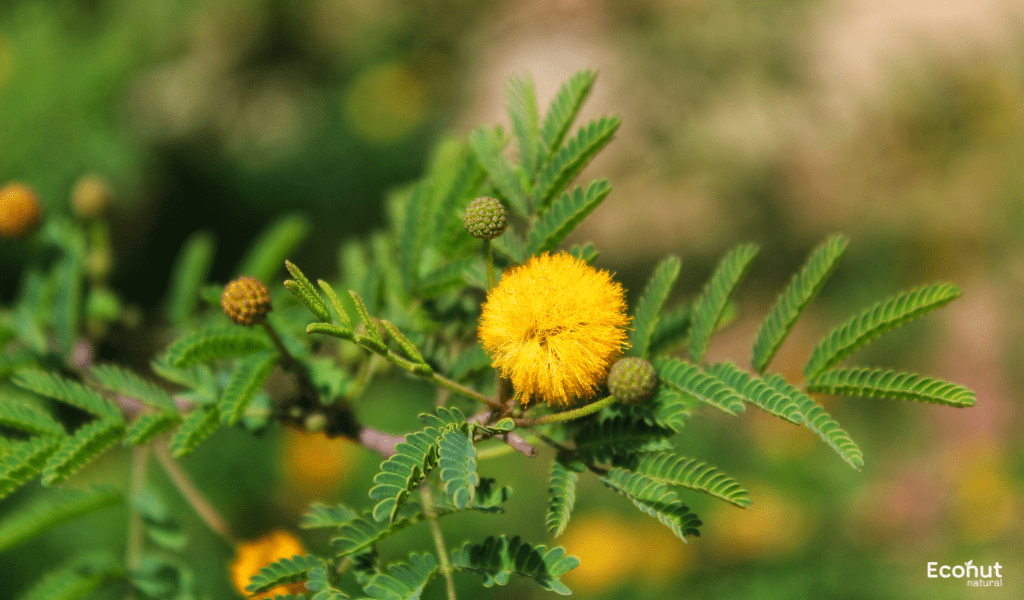Babul (Acacia Senegal) is a well-known herb that has been incorporated into Ayurvedic treatments for years. A small, spiny deciduous acacia tree belonging to the genus Senegalia. The herbal tree is a large, but not very tall, tree with spiny branches and winged, blue-green leaves.
Babul is well-known for its essential therapeutic qualities. Known by most as Babul, Acacia arabica grows in arid, sandy regions of India. It is primarily used as a cleaning agent, and consistent use helps to strengthen teeth and gums as well as lessen plaque and irritation.
Description
The babool tree’s bark, gum, leaves, seeds, and pods have strong antibacterial, antihistaminic, anti-inflammatory, astringent, and hemostatic qualities.
Botanical Name:
Acacia Senegal
Family:
Fabaceae
Leaves:
They are bipinnately compound, which means their leaflets are arranged in feathery structures that are twice split. The compound leaf’s main rachis, or central stalk, may have glands and is frequently downy.
Flowers:
Golden golden, carried on short stalks in globose heads, or spherical clusters. Usually, the blossoming season happens in the spring.
Pods:
The Babul tree produces an elongated, flattened pod that resembles a beaded or segmented object because the spaces between the seeds are frequently restricted. When fully grown, these pods turn brown and contain up to 12 seeds.
Habitat:
Naturally found throughout Asia from Arabia eastward to India, Burma, and Sri Lanka, as well as in the drier regions of Africa from Senegal to Egypt and down to South Africa.
Parts Used:
- Stem bark
- Fruit
- Gum
- Seeds
Dosage:
- Adults -10 to 20 ml
- Old age – 10 to 20 ml
- Children – 5 to 10 ml
Chemical Constituents
The highest concentration of tannin and phenolic compounds found in Acacia can be found in its root, leaves, pods, and bark. These include gallic acid, dicatechin, quercetin, robidandiol, β-amyrin, hentriacontane, betulin, sitosterol, kaempferol-3 chlorogenic acid, and glucoside isoquercetin.
Other Language Names of Babul (Acacia senegal)
Gujarati name – Babaria, Baval, Kaloabaval
Bengali name – Babla, Babul, Babool
Kannada name – Gobbli, Karijali
Hindi name – Babul, Kikar
Malyalam name – Karivelan, Karuvelum
Oriya name – Bambuda, Baubra
Punjabi name – Sak
Tamil name – Kaluvelamaram, Karrivelei, Karuvael, Karuvelam
English name – Babul, Black Babul, Indian Gum arabic tree
Ayurvedic name – Babbuuri, Baavari, Kinkiraata, Yugmakantaka, Shuulikaa, Shitaka
Scientific Classification
| Kingdom | Plantae |
| Clade | Angiosperms |
| Clade | Eudicots |
| Clade | Rosids |
| Order | Fabales |
| Family | Fabaceae |
| Genus | Senegalia |
| Species | S.senegal |
Ayurvedic Properties
Rasa (taste) – Kashaya – Astringent
Guna (qualities) – Guru – Heavy, Rooksha – Dry
Veerya – Sheeta – Coolant
Vipaka – Katu – Pungent taste conversion after digestion
Babul (Acacia senegal) Uses
Powder:
Because babool gum powder has analgesic and anti-inflammatory qualities, taking it once day with water will help relieve joint discomfort. Because of its antibacterial qualities, applying a paste made of Babool leaf powder and coconut oil helps treat dental health issues like gingivitis and plaque development.
Decoction:
DecoctionFor rectal prolapse, babool bark decoction may be utilized. For stomach ache, root bark decoction may be utilized. In prolapse, the leaf decoction is used as a nutool—a technique that involves pouring the solution over a particular area from a height.
Juice:
For coughs, babool bark decoction and chewing bark may be helpful. Applying babool leaf paste or juice can help reduce eye edema and redness. Nonetheless, using babool as a self-medication is not advised.
Toothbrush:
According to Indian Ayurveda, babul bark is mostly used to treat skin conditions, burn injuries, and maintain good oral and dental hygiene.
Babul (Acacia senegal) Benefits
Encourages Dental Health:
A common ingredient in toothpaste that promotes healthy teeth and gums is Babul (Acacia senegal) tree extract. In addition to encouraging good oral hygiene, Acacia arabica fights gum disease and dental cavities, both of which are linked to heart disease. When burned to ash, babool peels and pods are used as a toothbrush and as a toothache remedy. Tender branches are also used as a brush to strengthen teeth and treat dental problems.
Diabetes:
The high-fiber component even slows down your digestion and the pace at which glucose is absorbed. Insulin resistance, which is the primary cause of high blood sugar and diabetes, also known as diabetes mellitus, is reduced as a result, as well as insulin levels. Because it inhibits weight gain and lessens the negative effects of body fat on insulin resistance, it is also beneficial for the control of diabetes. Gum Arabic should be taken in conjunction with a high-carb meal to reduce insulin and blood sugar levels.
Weight loss:
The health advantages of gum Arabic are particularly beneficial for those who want to lose weight and tone up. Since foods high in fiber quickly fill you up and prevent overeating, it is renowned as the best suppressor.
Regulates hair loss:
Babool leaves work wonders for reducing hair loss and encouraging new hair growth. Apply the babool leaf paste to the scalp, let it there for 15 to 20 minutes, and then thoroughly rinse with warm water to prevent hair loss. To achieve the best results, always remember to wash your hair with a high-quality shampoo.
Heart Health:
It reduces the chance of getting heart disease. Its high fiber content facilitates easy digestion and, over time, lowers cholesterol. Better cardiac health equates to lower cholesterol. In the stomach, the soluble fiber decreases the absorption of cholesterol. This therefore causes your liver to produce more bile, a byproduct that aids in the body’s digestion of fat in diet. It even helps to regulate blood pressure.
Babul (Acacia senegal) Side Effects
Digestive issues:
Babul may result in mild digestive issues, such as bloating, nausea, loose stools, and gas.
Allergic reactions:
Babul can cause allergic responses in certain persons. Breathlessness, rhinitis, and conjunctivitis are possible symptoms. Babul should be used with caution if you have allergies, particularly to other Acacia species.
Pregnancy and breastfeeding:
Because of the possible risks to the developing newborn or infant, avoid Babul in following situations.
Read Also: Breckland thyme (Thymus Serpyllum) – Uses, Benefits, Dosage & Side Effects
Conclusion
An excellent ayurvedic herb with numerous health advantages is babool. Every portion of the plant, including the bark, branches, leaves, pods, and fruit, has a variety of therapeutic qualities. It helps heal wounds, improve oral health, treat skin disorders, and many other things.
FAQS
What is the benefit of Acacia senegal?
According to Indian Ayurveda, babul bark is mostly used to treat skin conditions, burn injuries, and maintain good oral and dental hygiene. Babula twigs have been utilized as natural toothbrushes in India because they are an astringent agent.
What is the medicinal use of babul?
Baboon gum has strong emollient, expectorant, detoxifying, aphrodisiac, and antipyretic properties as well. The gum from the babool tree calms the vata and pitta and is useful in treating kapha and pitta as well as urinary issues like UTIs, uterine bleeding, and discomfort.
What adverse effects does acacia powder have?
Reports of allergic responses exist. Clinical research documented a number of adverse effects, including as bloating, moderate diarrhea, early morning nausea, and an unpleasant mouth sensation.

